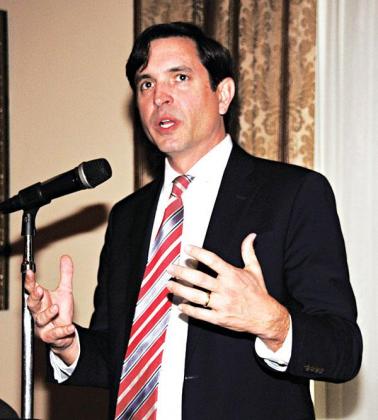
Zachary Fitzgerald
State leaders must focus on creating a climate conducive to job growth while spending government funds more wisely if they ever hope to solve Louisiana’s chronic budget woes, an industry advocate said Monday.
Stephen Waguespack, president of the Louisiana Association of Business and Industry, was guest speaker during the St. Mary Industrial Group’s monthly meeting at the Petroleum Club of Morgan City on Monday.
The 2016-17 state budget is $27.9 billion, the largest budget in state history. But the state still has a mid-year, $300 million deficit and will go into a special session Monday to address that deficit.
Another $400 million to $500 million deficit awaits state legislators to deal with for the 2017-18 fiscal year in the regular session starting April 10.
To try to fix the state’s budget deficit, state leaders must work to grow the economy, Waguespack said.
“We need a jobs plan, not a government plan,” Waguespack said.
Job losses are severely hurting tax collections and, in turn, the state budget, he said. Since January 2015, the state has lost 26,000 jobs and 12,000 in the past 12 months.
Louisiana officials have to bring investment from other states to achieve economic growth, he said.
The state has the ports, waterways, railroad, resources and the “only major development going on in the country offshore,” Waguespack said.
“What we don’t have is a very hospitable business climate,” he said.
Louisiana needs a jobs plan to bring out-of-state investment quickly.
A negative legal climate is threatening the potential for job growth, Waguespack said.
“Lawsuits have continued to be a challenge that I hear from businesses all across the state,” he said.
“State-driven efforts” to file lawsuits against the oil and gas industry have made the legal climate worse during the past year, he said.
The state should reign in government spending and make wiser financial choices. State spending is projected to rise 3.8 percent during the next five years, while the economy is expected to grow 1.7 percent a year, he said.
Officials should also reform the tax code and decide what the state’s priorities should be.
State leaders have created several task forces to study possible fixes to the budget, but Waguespack says those task forces aren’t providing solutions “people are looking for.”
Among the solutions the task forces have proposed, so far, are to raise taxes on business utilities, raise taxes on manufacturing machinery and imports, make sales tax increases permanent and expand that increase to other services, Waguespack said.
Since 2009, Louisiana state government has had 15 mid-year deficits. During the past two legislative sessions, state officials have raised about $2 billion in new taxes. Three of the last four sessions were dedicated to increasing revenues.
“But the problem’s not going away,” he said.
Dedicating funds for specific uses so they can’t be tapped for other uses is another major budget problem the state is facing.
“We’ve got to stop locking up everything to all the pet interests, put more money on the table,” he said.
Of the 2016-17 budget, state leaders can only choose how to spend roughly $3.5 billion of that money. Possible uses for those funds are for health care, higher education and prisons, he said.
Higher education has been the area most vulnerable to cuts.
However, state officials have the power to un-dedicate funds through legislation, Waguespack said.
Efforts to increase employer mandates, such as minimum wage and equal pay laws, “really put a damper on small businesses, especially those that are trying to compete in a tough climate,” he said.
Technology is making producing oil and gas easier around the world.
“If we tax and sue people to death here, they will go elsewhere,” Waguespack said.
There is a need for additional investment in infrastructure, but that investment needs to be “done in an economically friendly way,” he said.
“People are not listening to the private sector concerns out there,” he said.
Waguespack said he plans to continue to make sure the voice of businesses is heard on the state level, and he encourages local business owners to do the same.
